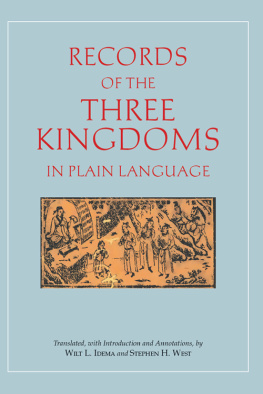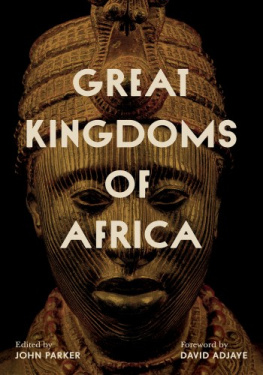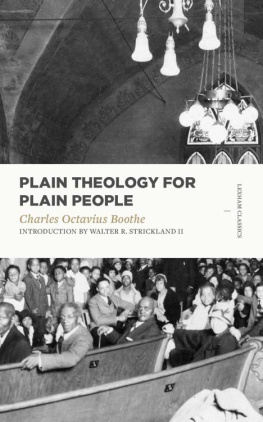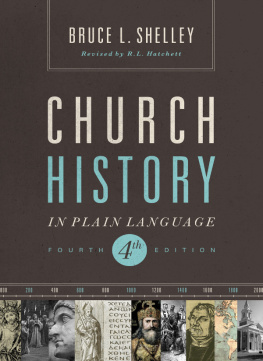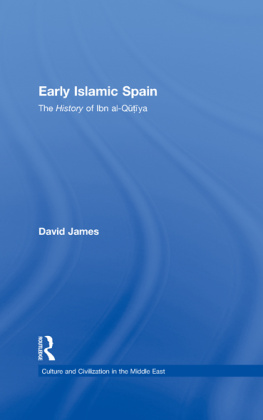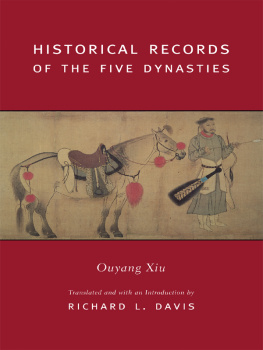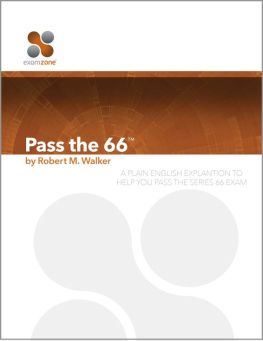
Records of the Three Kingdoms in Plain Language
Records of the Three Kingdoms in Plain Language
A NONYMOUS
Translated, with Introduction and Annotations, by
Wilt L. Idema and Stephen H. West
Hackett Publishing Company, Inc.
Indianapolis/Cambridge
Copyright 2016 by Hackett Publishing Company, Inc.
All rights reserved
Printed in the United States of America
19 18 17 16 1 2 3 4 5 6 7
For further information, please address
Hackett Publishing Company, Inc.
P.O. Box 44937
Indianapolis, Indiana 46244-0937
www.hackettpublishing.com
Cover design by Rick Todhunter
Composition by William Hartman
Library of Congress Cataloging-in-Publication Data
Names: Idema, W. L. (Wilt L.) translator. | West, Stephen H., translator.
Title: Records of the Three Kingdoms in plain language / translated, with
an introduction and annotations, by Wilt L. Idema and Stephen H. West.
Description: Indianapolis : Hackett Publishing Company, Inc., 2016.
Identifiers: LCCN 2016009481| ISBN 9781624665233 (pbk.) |
ISBN 9781624665240 (cloth)
Subjects: LCSH: Chinese dramaTranslations into English.
Classification: LCC PL2658.E5 R45 2016 | DDC 895.1/2008dc23
LC record available at https://lccn.loc.gov/2016009481
ePub ISBN: 978-1-62466-588-2
Mulan: Five Versions of a Classic Chinese Legend, with Related Texts. Translated and Introduced by Shiamin Kwa and Wilt L. Idema.
Battles, Betrayals, and Brotherhood: Early Chinese Plays on the Three Kingdoms. Edited and Translated, with an Introduction, by Wilt L. Idema and Stephen H. West.
Monks, Bandits, Lovers, and Immortals: Eleven Early Chinese Plays. Edited and Translated, with Introduction, by Stephen H. West and Wilt L. Idema.
We would like to thank Professor Oki Yasushi for helping us acquire relevant Japanese materials and translations, Liu Lidan for her help in assembling the manuscript and glossary, and the anonymous readers who provided valuable comments on the original draft.
The Introduction to this narrative provides historical and cultural context for the text and some general consideration of its structure and themes. These are not entirely necessary to get the general gist of the story. You will find them helpful, however, in placing the Plain Tales within its cultural and generic context. Should you decide to move immediately to the story itself, you should be aware of the following guides to help you understand it better.
Measurements: A li is approximately one-third of a mile; a Chinese foot is approximately thirty-two centimeters or roughly ten inches. A Chinese pace or step is equal to a modern double pace, approximately five feet.
Names: Each of the characters is identified by one of sometimes several names. We have chosen to retain the original variety of names for the simple reason that Chinese does not use pronouns in addressing the self or others, preferring to refer to people by their rank within the family, their official title, or their social status. China was, and is, a strongly hierarchical society, in which age, status, and gender carry weight. Names are thus not just designators of people, but are also indexical to their status vis--vis the speaker. For instance, Liu Bei, the major figure of the text, is known by several designations:
Liu Bei is a combination of his surname Liu and given name Bei. This name is only used in official documents or in historical retrospect, for instance by the narrator. It would be unthinkable to call a person by his given name in normal contexts.
He also has a familiar name, Xuande, a public-use name given in later childhood and used by superiors, close friends, and family members. Even the narrator uses this name when he wants to establish an authoritative sense of intimate knowledge when describing Liu Beis activities, or wants to create a sympathetic bond between the audience and the character, inviting them into that circle of supposed intimacy through the use of this name.
Liu Bei is also called variously the Vanguard, the District Protector, the Magistrate, or such-and-such general. This of course designates his role in a military or civil bureaucracy. This is the normal form of address between members of the civil or military institutions.
{ix} In addition, Liu Bei is referred to as the First Ruler, since he would become the first ruler of the Shu-Han, which he and Zhuge Liang eventually established. This was a way to distinguish him from his son, the second and last ruler of the Shu-Han, who is designated as the Young Ruler or Later Ruler.
Finally, after his kinship to the royal family was confirmed by checking his lineage against the Imperial Geneology, he was called the Imperial (Younger) Uncle. This name occurs only after this incident takes place in the narrative, and is used primarily by his colleagues when they speak about him to a third party.
Likewise Guan Yu (surname and given name) is known as Yunchang, his public-use name, Zhang Fei as Yide, and Zhuge Liang as Kongming. Zhuge Liang is also known as the Reclining Dragon, a sobriquet often understood as his Daoist name.
It is a feature of the text that upon first appearance, the given and public-use names are usually provided, along with the civil or military title, and any sobriquets will be stated and explained.
Background-highlighted text: These are found in the original printed edition of the work and are reproduced here, using a black box holding white text. The function of these highlights is not always clear; they may be related to either printing convention, as markers within the original story, or otherwise some sort of signal to the reader (perhaps even artifacts from the oral cycle itself). They often seem to denote what might be considered a particularly famous or well-known episode. They may introduce poems, following episodes, and they may occur at the beginning of a phrase or interrupt what would be considered a complete thought. We have retained them as what were obviously important features of the original text.
SHANG ca. 14601045 BCE
ZHOU 1045256 BC
Western Zhou 1111771 BCE
Eastern Zhou 770256 BCE
Spring and Autumn 722476 BCE
Warring States 475221 BCE
QIN 221207 BCE
HAN 206 BCE220 CE
Western Han 206 BCE9 CE
Eastern Han 25220
THREE KINGDOMS 220266
Wei 226266
Wu 222280
Shu-Han 221264
WESTERN JIN 266316
NORTHERN AND SOUTHERN DYNASTIES 386589
SUI 581618
TANG 618907
FIVE DYNASTIES 907960
SONG 9601279
Northern Song 9601127
Southern Song 11271279
LIAO 9161125
JIN 11151234
YUAN 12601368
MING 13681644
QING 16441911
WESTERN HAN 206 BCE 9 CE
XIN 923
EASTERN HAN 25220
| Guang Wudi | 2557 |
| Mingdi | 5775 |
| Zhangdi | 7588 |
| Andi | 106125 |
| Shundi | 125144 |
| Chongdi | 144145 |
| Zhidi | 145146 |
| Huandi | 146168 |
| Lingdi | 168189 |
| Shaodi | 189 |
| Xiandi | 189 | Yonghan |
| 189190 | Zhongping |
| 190194 | Chuping |
| 194196 | Xingping |
| 196220 | Jianan |
| 220 | Yankang |

